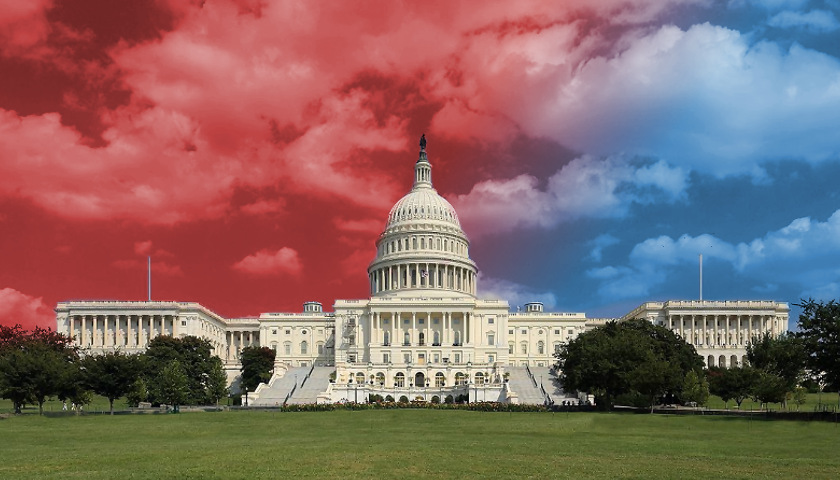by Susan Crabtree
President Biden and other White House officials dramatically changed their tune this week in defending their green agenda in the face of skyrocketing gas prices and Russia’s energy supply stranglehold over Europe.
Before Russia invaded Ukraine, Biden for months blamed increasing gas prices on supply-chain issues and pent-up post-pandemic demand for travel, deflecting questions on whether his push to move the country off fossil fuels was a factor.
Now the administration is laying the blame directly on Russia. After announcing a ban on Russian oil imports to the U.S., Biden on Monday described the spiking gas prices as a necessary cost all Americans must bear to strike a blow to Putin’s “war machine,” as attacks on Ukraine intensified.
Asked what he plans to do to bring down gas prices, Biden threw up his hands earlier this week, essentially saying there’s nothing he can do.
“Russia is responsible,” he told reporters. The latest intransigence came Wednesday during White House Press Secretary Jen Psaki’s briefing with reporters. Would Biden ever resurrect the Keystone XL pipeline, as some top officials in Canada are calling on him to do?
“There’s no plans for that, and it would not address any of the problems we’re having currently,” Psaki responded.
But other oil and gas experts, and the top government official of Alberta, argue just the opposite – that restarting construction of the 1,240-mile duct connecting Canada and Nebraska would signal a U.S. energy revival and help bring down prices.
Blaming Putin for pain at the pump is no accident. It’s a poll-driven strategy, according to Democratic pollster Celinda Lake, who told NBC News earlier this week that her work indicates that pointing to Putin and accusing oil companies of price-gouging resonates with voters.
It won’t be as easy for congressional Democrats in tough reelection fights to pass the buck, especially those in states where thousands of jobs depend on energy production or where gas prices are the highest. Months before oil hit $105 a barrel, Biden’s flagging poll numbers were already weighing down Democrats’ midterm outlook. More recent polls have brought the Democratic Party’s liabilities into sharper relief. An NPR/PBS/Marist poll released March 1 found that 56% of all voters (including 15% of Democrats) considered Biden’s first year in office a failure.
Republicans are already hitting the most vulnerable Democrats for their green legislative agenda, highlighting specific votes on bills limiting oil and gas production or shutting down the Keystone pipeline. Democrats can expect an avalanche of attacks as long as gas prices remain high.
Just a few months ago, House Democrats were the ones itching for a fight over oil and gas. Last fall, the House Committee on Oversight and Reform launched investigations into oil and gas companies’ records on contributing to climate change, hauling their executives before Congress. Rep. Carolyn Maloney, who chairs the panel, promised that oil companies would face their “Big Tobacco moment,” a comparison to the series of hearings Congress held in 1994 when the CEOs of all the major tobacco companies admitted the harmful health effects of nicotine.
What a difference a few months makes, along with $5-a-gallon gasoline. A new poll conducted by leading Democratic pollster Impact Research and released Wednesday found that voters in several midterm battleground states favor continued natural gas production and export as a way to achieve energy independence from foreign sources and help U.S. allies become less reliant on Russian energy supplies.
The poll found that 80% of voters, including 80% of Democrats, agree that America’s energy future must include a mix of renewables and natural gas. The numbers are consistent across several battleground states, including Pennsylvania, Arizona, and North Carolina. Seventy-four percent of those surveyed believe the government should prioritize reliability and affordability with a gradual shift to clean energy, versus 22% who prefer an energy policy akin to the Green New Deal, which aggressively moves to 100% renewable energy even if it costs consumers more each month. Moreover, 72% of respondents reported that rising costs are creating problems for their families.
Seeing these red flags, several state Democratic officials have announced plans to temporarily cut the same gasoline taxes their party recently enacted. California Gov. Gavin Newsom, who is facing reelection, and New York Gov. Kathy Hochul are so concerned about record gas prices in their states that both floated plans for a gas tax rebate this week. Meanwhile, Democratic governors in Colorado, Michigan, Pennsylvania, and Wisconsin sent a joint letter to congressional leaders urging them to back legislation suspending the federal 18.4-cents-a-gallon gas tax through 2022. Pennsylvania’s 57.6-cents-a-gallon tax is the highest in the nation, just ahead of California’s.
Not surprisingly, Republicans are trying to capitalize on the rapidly shifting dynamic. with the midterm elections looming this autumn. “California gas prices are the HIGHEST IN THE COUNTRY with an average of $5.44 per gallon,” the National Republican Congressional Committee said in a Thursday press release. “And prices would be even higher if Katie Porter and Mike Levin had their way.”
The statement also notes that California Reps. Porter and Levin backed a bill that would charge a tax on fossil fuel use, which would “drive gas prices even higher.”
The pair from Southern California also backed a provision in the Build Back Better bill specifically targeting the drilling allowed in a small portion of the Arctic National Wildlife Refuge.
The U.S. Geological Survey estimates that technically recoverable oil within ANWR (excluding state and Native areas) is between 4.3 billion and 11.8 billion barrels. The move followed the Biden administration’s suspension of oil and gas exploration in ANWR’s coastal plain, a signature priority of the Trump presidency. The Biden administration policy would repeal the lease program provision from the 2017 tax bill. As members of the Natural Resources Committee, both Porter and Levin last year opposed a GOP amendment to strike the provision from the bill in a party-line vote.
Levin spokesman Eric Mee defended his boss’s votes and commitment to Democrats’ green agenda. Levin, an environmental attorney, represents a district straddling the coastal areas of south Orange and north San Diego counties, including Camp Pendleton, one of the largest Marine Corps bases in the country.
“Clearly, proposed legislation that hasn’t become law does not affect the current situation with Russia,” Mee told RealClearPolitics. “The United States is still the world’s top producer of oil and gas. Rep. Levin will continue to work to reduce our dependence on fossil fuels and foster sustainable, clean domestic energy independence.”
Levin and Porter have taken nearly $100,000 each from environmental groups, according to opensecrets.org.
Around the country in Texas, Ohio, and Pennsylvania, where hundreds of thousands of jobs are tied to the energy sector, Democrats could also face scrutiny for their statements and votes. Two House Democrats representing Pennsylvania have heartily embraced the green agenda, for instance, even though doing so negatively impacts local jobs.
Rep. Matt Cartwright, who represents a large northeastern swath of Pennsylvania, voted against the Keystone pipeline four times since 2013. He also said he was “all on board” with the progressives’ Green New Deal, spearheaded by Rep. Alexandria Ocasio-Cortez of New York and Sen. Ed Markey of Massachusetts. The plan calls for moving the U.S. economy off fossil fuels in 10 years through such drastic measures as substituting air travel with high-speed rail and upgrading or replacing all buildings in the U.S. to be energy efficient over the next decade.
“I’m all on board – we have to move toward reducing carbon emissions,” Cartwright said in a CNN interview in 2019. “I was severely disappointed when we stepped away from the Paris Accords. [The] United States needs to take a leadership position in the world and in addressing climate change, and stepping away from Paris is the opposite of that.”
He qualified his support seconds later, saying he’s “looking at the Green New Deal,” adding, “But what we need to do is boil it down to an actual legislative proposal, and then we run through the traps to make sure it makes sense.”
Rep. Susan Wild, a two-term member representing parts of the Philadelphia suburbs also lauded the environmentalists’ agenda, albeit with qualifications.
“I think the aspirations of the Green New Deal are wonderful, and I think it’s exactly – they’re exactly on point,” she told a NextGen conference in 2019. However, she noted that she hadn’t signed onto the plan yet and argued that a market-driven solution, rather than a statement of aspirations, is “the way to go.”
Even though Democratic leaders are bracing for attack ads highlighting these votes, they didn’t help themselves this week when pressed on their plans to soften the blows and address energy prices. At a Tuesday press conference, House Democratic Conference Chair Hakeem Jeffries said the issue of record gas prices “hasn’t come up” during his party’s caucus meetings.
“But I think increasing the global supply, at the moment, to the extent that there are implications, particularly for Europe, which is more heavily reliant upon Russian oil than we are here in the United States of America,” Jeffries continued, “you know, it’s an important discussion.”
With news that Biden is turning to Venezuela, Iran, and Saudi Arabia – checkered oil regimes many past U.S. leaders have tried to avoid – to increase global supplies and bring down prices, it’s a discussion Republicans are eager to have.
– – –
Susan Crabtree is RealClearPolitics’ White House/national political correspondent.



















